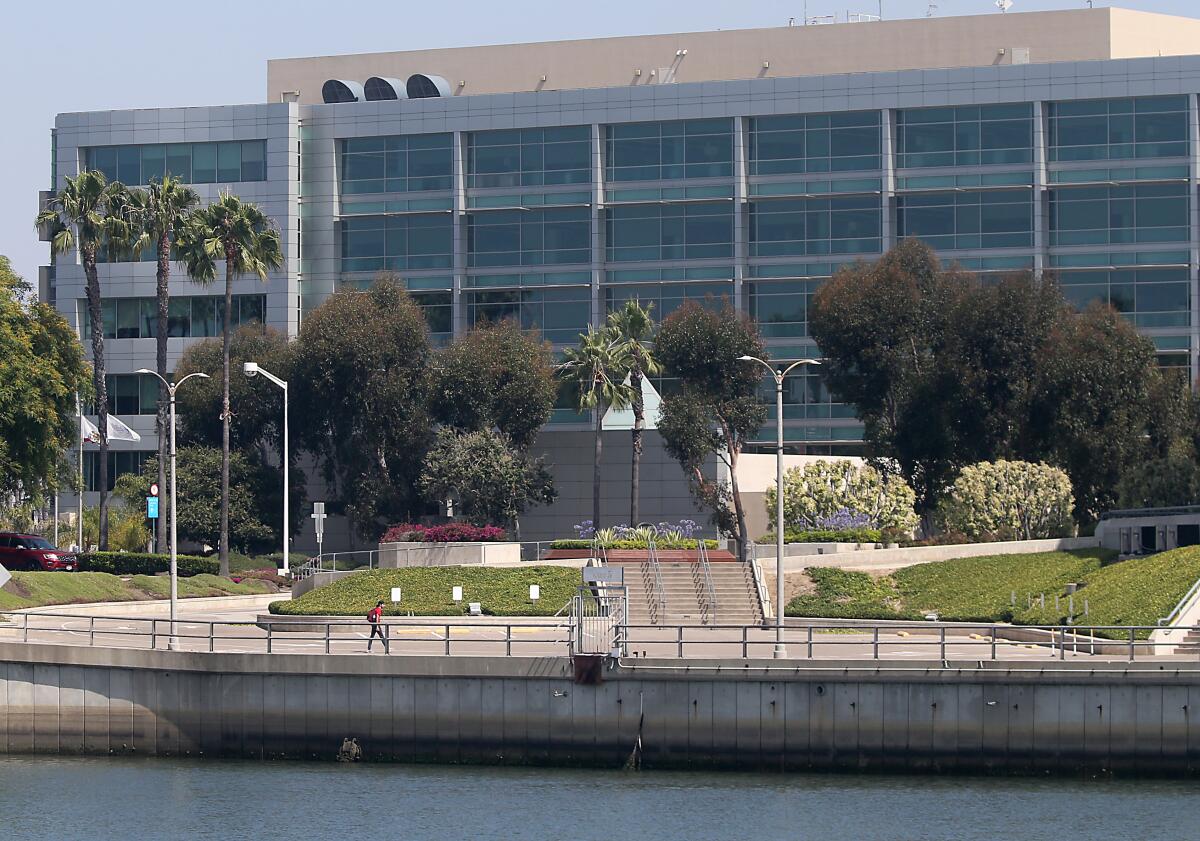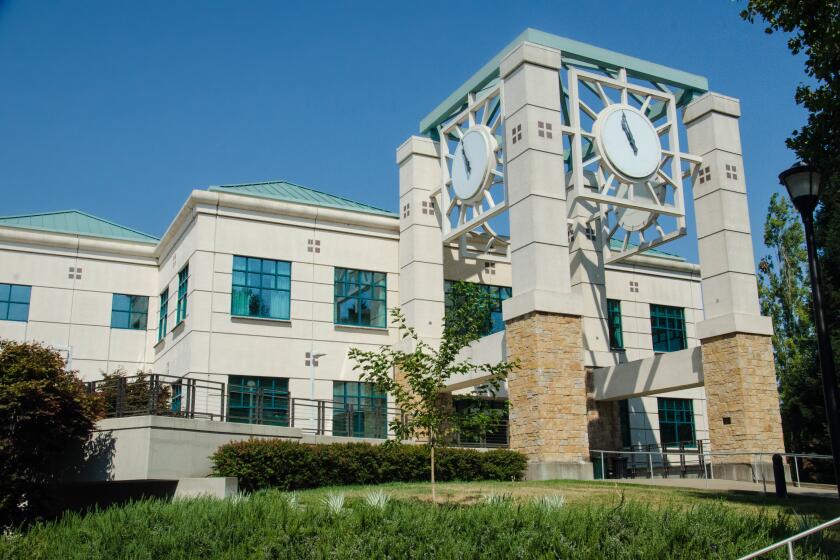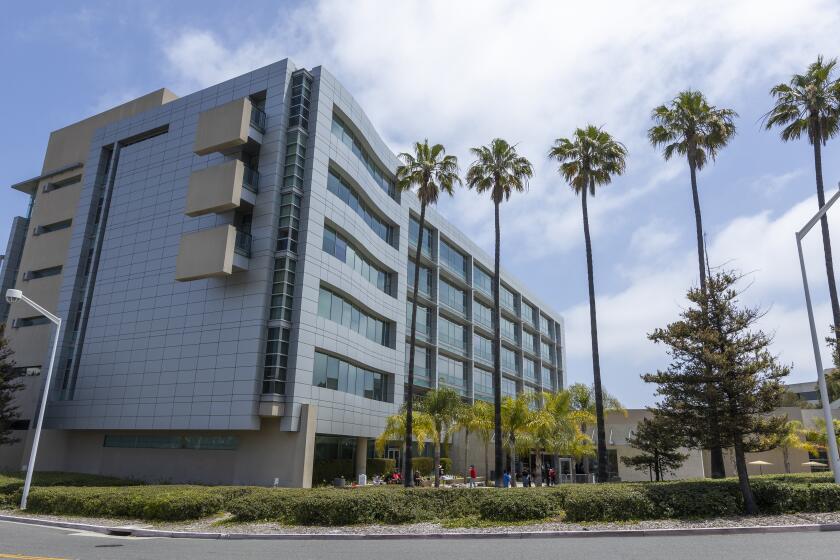CSU didn’t investigate some sexual harassment reports, track repeat offenders, audit finds

- Share via
State auditors have found “numerous problems and inconsistencies” with sexual harassment investigations across California State University and faulted the chancellor’s office for not providing campuses detailed guidelines to address allegations against employees, according to a confidential draft report reviewed by The Times.
The 108-page report by the California state auditor’s office paints a troubling picture: Campus officials failed to investigate multiple accusations because of “questionable” judgment, improperly documented cases and did not order discipline or training when wrongdoing was substantiated. The handling of complaints, the audit concluded, “demonstrated a level of inconsistency from case to case and from campus to campus.”
The findings of the audit, scheduled to be released July 18 , are similar to some of the conclusions previewed in May in a separate study ordered by the CSU Board of Trustees.
But the state report presents new information that summarizes problematic cases and provides data showing that the vast majority of sexual harassment reports against employees from 2018-22 were never formally investigated.
More than 1,200 sexual harassment reports were made against employees in the four-year period. Auditors identified at least 150 employees who repeatedly violated CSU policy and accounted for more than 30% of all reports. Shoddy data collection, however, prevented officials from tracking repeat offenders.
The chancellor’s office also uncovered multiple problems with campus sexual harassment investigations across the system in 2017, a year before the audit’s review period began, but kept the findings secret — an action that “did not ensure transparency,” according to the audit.
The draft report noted that the chancellor’s office is legally responsible for oversight of the 23 campuses in the nation’s largest four-year public university system. Yet the office “lacks complete and accurate information about the total number of cases of alleged sexual harassment and related details,” which “limits its ability to address problematic trends,” auditors said.
“The chancellor’s office must take a more active approach to providing oversight,” the report concluded.
The audit recommended about two dozen reforms that the chancellor’s office should implement beginning in July 2024. They included developing specific guidelines on launching investigations, improving record-keeping and case-tracking systemwide, and requiring campuses to document when employees have been accused repeatedly.
In a statement Thursday, CSU spokesperson Amy Bentley-Smith said the chancellor’s office could not comment because the audit has not been publicly released.
The state report comes as CSU gains a new leader. On Wednesday, Mildred García, a former president of Cal State Fullerton, was named the system’s new chancellor.
Speaking generally about sexual harassment issues at CSU, García told The Times that the chancellor’s office would take a more aggressive role in monitoring misconduct.
“People have to be held accountable for ensuring that we have a caring environment for everybody that works there,” she said.
Higher education experts said that the audit’s findings were troubling and that the lack of oversight and intervention left employees and students vulnerable to ongoing predatory behavior.
“People who are causing harm, who are breaking the law, who are endangering employees and endangering the work that universities are doing are experiencing real protection from the institution,” Kamaria Porter, an assistant professor of education at Penn State, said in response to the findings.
The “cascading failures,” including the lack of transparency and breakdowns in oversight, have put students and employees at risk, Porter said.
In their responses to auditors, CSU administrators agreed with the overall findings but cited limited resources in their reluctance to undertake more aggressive oversight and a hesitancy to establish additional guidelines for “already overburdened campus officials.”
Auditors based their findings on sexual harassment records at each campus and the chancellor’s office as well as reviews of dozens of case files and interviews with CSU officials, including senior administrators in the chancellor’s office in Long Beach.
In ordering the audit last year, state lawmakers cited Los Angeles Times investigations that detailed breakdowns in the handling of sexual harassment complaints, including campus officials not investigating some accusations and failing to impose discipline for CSU policy violations.
The Times also reported that the chancellor’s office did not investigate claims that the president of Cal State Fullerton inappropriately touched three students and accusations that the husband of the former Sonoma State president sexually harassed women. Both told The Times they had done nothing wrong.
Recent revelations about how California State University handled sexual harassment and workplace retaliation complaints have rocked the nation’s largest four-year public university system.
The scope of the audit, per the direction of lawmakers, focused on complaints in which faculty and staff were accused of sexual harassment. Those who alleged wrongdoing included students and employees.
During the four-year period studied by auditors, CSU had two permanent chancellors — Timothy P. White and Joseph I. Castro.
Castro resigned last year after he was swept up in a controversy over his handling of sexual harassment and retaliation reports against a top administrator when he was president of Fresno State.
Auditors provided examples of cases that were not investigated or not substantiated for questionable reasons, as well as instances in which no discipline was ordered after employees were found to have violated CSU sexual harassment policy.
Officials at one campus, for example, concluded that a professor engaged in “sexual harassment, sexual violence and stalking,” but the campus waited five years to take action. By then, according to the audit, officials issued only a written reprimand because state law requires that discipline be imposed within three years of a finding of wrongdoing. Campus officials did not explain the delay to auditors.
The professor had been the subject of repeated sexual harassment complaints since 2003 and was found to have violated CSU sexual harassment policy in another case, according to the audit.
“The absence of discipline in this case is particularly concerning considering the severity of the conduct and the professor’s history of similar complaints,” the audit concluded.
The report noted that the chancellor’s office does not require campuses to track repeat offenders.
Under CSU policy, the professor was entitled to a positive letter of recommendation because he was not terminated for sexual harassment violations. The audit recommended that CSU amend its guidelines on such recommendations to exclude anyone found to have violated sexual harassment policy.
In another case, several women alleged that a male staffer made inappropriate comments, including asking one woman whether her sex partners pleased her, noting that another wasn’t wearing a bra and saying to one that her boyfriend was lucky to have a woman like her.
Campus officials were also aware of additional women who had complained that the employee made them feel uncomfortable.
The campus was unable to provide documentation that the additional women were contacted, and no formal investigation was launched because campus officials concluded that the man’s comments were “not of a sexual nature,” according to the audit.
At one campus, a student alleged that a male professor made inappropriate comments about her body, walked her toward her residence after class, talked about his romantic life and compared her to women he had dated.
The student submitted a “detailed written complaint” and stated that she “wanted action taken,” auditors said.
But campus officials failed to investigate and provided no documented rationale to auditors, saying only that the accusations were “on the border” of meeting the definition of sexual harassment under CSU policy.
“We are uncertain why the campus decided not to conduct an investigation,” auditors said.
Auditors described CSU data as “unreliable” because of inconsistent record management. Still, the findings provide new insights that highlight breakdowns at the crucial intake stage of the complaint process, which the audit blamed on a lack of detailed guidance and “unreasonably restrictive” interpretations of what constitutes sexual harassment under CSU policy.
“CSU policy should give the benefit of the doubt to more nuanced or borderline allegations,” the audit concluded.
Of more than 1,200 reports alleging sexual harassment against CSU employees, 80% were not formally investigated. Of those that were investigated, about 38% were substantiated, according to the audit.
In half of the 40 cases studied, auditors were unable to determine whether campus officials took appropriate action because files were missing key documents such as interview notes, evidence gathered and corrective measures.
A recent Times analysis of CSU records found that officials completed investigations for only about 3% of more than 2,600 reports for the 2021-22 school year that were lodged against students and employees accused of sexual harassment and sexual misconduct, which includes rape and sexual assault.
A report found flaws in the Cal State system’s data collection on sexual harassment and sexual misconduct cases and cited wide distrust by students and employees.
The number of sexual harassment allegations a campus receives is typically far fewer than the number of instances, largely due to a lack of trust in an institution’s ability to bring justice. Experts said that is especially true at institutions such as CSU where many students come from historically neglected communities and may be skeptical of authority.
Experts said that number is also affected when campuses don’t clearly define their interpretation of sexual harassment, as state auditors concluded about CSU.
“Not only are people feeling harassed and not reporting because of power imbalances … but I would say there is a large portion of individuals that don’t understand that what they’re experiencing is harassment,” UCLA associate professor of education Jessica Harris said about the challenges students and employees face at universities.
Record-keeping in the chancellor’s office was so poor that it was unable to provide a “complete list of sexual harassment reports for its own employees,” forcing auditors to compile their own tally based on a review of files.
The report faulted the chancellor’s office for not completing formal reviews of sexual harassment procedures at each campus, which top CSU administrators promised to do every three years after a 2014 state audit found breakdowns in sexual harassment training and education.
After reviewing 10 campuses, an official in the chancellor’s office raised “multiple concerns” with the CSU general counsel in 2017 about investigations that failed to address accusations, inappropriate discipline and other issues. The chancellor’s office was unable to provide documentation that the problems were corrected, according to the audit.
The chancellor’s office, citing attorney-client privilege, kept the findings secret and provided no public forum to discuss the concerns, auditors said.
“Publicizing these reports is a step in the right direction for transparency,” the audit concluded.
The vice chancellor overseeing human relations told auditors that publicizing the findings of campus surveys would “inhibit the fact-gathering process, in part by discouraging witnesses from coming forward,” but the audit noted that CSU has previously released similar records.
The Times repeatedly requested the same campus reviews last year, also noting that similar reports had been made public. The chancellor’s office refused to release the records, saying they were confidential.
Among their recommendations, state auditors said the chancellor’s office should provide detailed guidelines on assessing accusations at the intake stage, adopt best practices recommended by the U.S. Department of Justice and require campuses to document reasons when they decline to investigate.
The chancellor’s office also needs to track cases systemwide and require campuses to use the same case management system to help ensure consistency.
“Clearer and more comprehensive guidelines are necessary,” the audit concluded, “to ensure that campuses systemwide handle reports of sexual harassment in an appropriate and consistent manner.”
Times staff writer Debbie Truong contributed to this report.
More to Read
Sign up for Essential California
The most important California stories and recommendations in your inbox every morning.
You may occasionally receive promotional content from the Los Angeles Times.

















